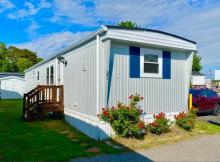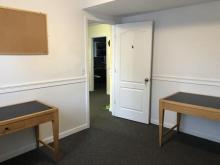Schools’ proposed FY25 budget sees 10% increase
Amid contractual obligations, inflation, utilities and a rise in out-of-district tuition fees, a 10.26% increase has been anticipated in the schools’ Fiscal Year 2025 preliminary budget, according to Superintendent of Wareham Public Schools Matt D'Andrea.
D’Andrea presented the proposed budget in a meeting with the School Committee and Select Board on Thursday, Dec. 7.
In Massachusetts, the fiscal year ends on June 30 and begins July 1.
The FY24 budget, which was increased by 4.7% from FY23, was approximately $37 million and the new projected budget is just over $39 million.
However, after revenue offsets such as grants and other financial programs through the state and federal governments the FY24 budget comes down to approximately $34 million. Predicted revenue offsets for FY25 would bring the budget down to just under $37 million, said D’Andrea.
School Committee member Brennan McKiernan said he knows getting the money to accommodate these financial needs is not simple. “I know it's not that easy.”
However, he said budgeting involves prioritization and “what could be a bigger priority than our kids?”
Select Board member Ronald Besse said, “I don't know that it's so much about not having a willingness to want to invest in our kids. It's the ability.”
One of the larger increases for FY25 is out-of-district education fees, including both collaborative and private tuition, which is primarily used for students with disabilities, according to D'Andrea.
Depending on the institution and students’ needs, tuition can range from $30,000 to $90,000 and even to $200,000 for each student, according to district Finance Director Kristin Flynn. These fees are set by the state and collaborative and are therefore out of the district’s control.
She said the higher tuition costs are for students who need “significant” intervention and therefore need to live at the school.
Tuition fees account for 41% of the preliminary expense budget, which is the budget’s largest expense.
The next two largest items on the predicted expense budget, excluding salaries, are maintenance and utilities, making up 21%, and pupil services, making up 19%.
School Committee member Apryl Rossi emphasized the importance of pupil services, including extracurriculars and additional learning opportunities.
She said when her son went to college he was much more prepared to live independently than his peers, such as his roommates, because he learned financial literacy and cooking at Wareham High School.
“There are districts across the state and towns that have three times the funding available to them that don't offer what we offer our students and the fact that our reputation doesn't accurately represent what our teachers do, what our students do and what our schools have to offer — it kills me every day,” she said.
Select Board member Alan Slavin highlighted the fact that many Wareham students attend schools outside the district such as Upper Cape Regional Technical School. He said it is a “crime” that Wareham isn’t retaining these students.
D’Andrea said this issue is not unique to Wareham and that there are decreasing high school enrollments across the Cape, including Bourne.
Salaries account for 77% of the total preliminary budget, according to D'Andrea. The preliminary budget does not reflect ongoing contract negotiations with staff, including the Cost of Living Adjustments, which will also increase the total cost.
D'Andrea said since he started as superintendent, 12 staff positions have been “reduced.”
“I feel that we're in a good spot right now,” he said. “We have the staff we need to provide our students with the education they need.”
He added, “It's unfortunate that we're looking at a 10.26% [increase] and I recognize that's a huge number that the town [will look] at and [say], ‘That's too much.’”
D'Andrea said a second preliminary budget was prepared with a 6.73% increase. However, this budget would require him to cut 20 positions.
He added he hopes the governor is able to provide additional funding to the schools this year because “this is a pickle that we're in and making these cuts will be significantly impactful for our students.”
Slavin said, “We have a system here that hasn’t worked for a long time and we keep letting it go the same way.”
He said, “We are not using the monies we have efficiently and properly,” adding change needs to happen.
Slavin said if the school were to receive the additional money it is requesting, the other town departments will reap the consequences.
He said the school spent money that did not come from a long-term funding source and now that money is no longer available, adding that by doing so the school only postponed a problem that they will now need to find a solution for.
“The state may come back and give you some of it [funding], but you’ll probably have to cut $2 million out of your budget more than what you think you do,” Slavin added.
D’Andrea said in terms of the temporary funding, the options were to either have the problem then or now and decisions were made at the time that “kept the district afloat.”
School Committee member Geoffrey Swett said it’s a Catch-22 situation. The schools can’t afford what it needs and neither can the taxpayers, but education is an “essential function” of the town.
He said telling teachers to be more “efficient” without providing additional tools to help with productivity is the same as asking them to give inferior care to each of their students.
Almost 75% of Wareham students have been identified as “high-needs,” meaning that they are low-income, current or former English Language Learners or students with disabilities.
Swett said these students need as much attention from their teachers as they can get. “If we start to make our product inferior, we will only exacerbate the problem.”
At the meeting, members of the Finance Committee were present, but did not meet a quorum, so they participated as individuals.
Finance Committee Chair Norma Scogin said without knowing what state aid will look like or staff salaries, “It really is a very challenging position to be in for all of us.”
Scogin said it might be time to consider an override using Proposition 2 1/2, which allows a town to raise taxes past the automatic annual 2.5% increase.
However, this would need Town Meeting approval. Slavin said an attempt at an override several years ago failed with 70% of voters in opposition.
He added part of the problem is that residents do not trust the town officials.
Rossi said the only way to regain the trust of the voters is by being transparent, taking accountability and being vocal, honest and upfront when an issue arises.
She added there needs to be more collaboration and communication among the various town boards and committees because if they do not present a united front and don’t seem to trust one another then the residents are never going to trust them.
School Committee member Joyce Bacchiocchi reminded everyone at the meeting that it is still early to be thinking about the budget and she is going to remain optimistic that within a few weeks they will know more about state funding and contracts and have a better idea of how to manage the necessary increases.

















